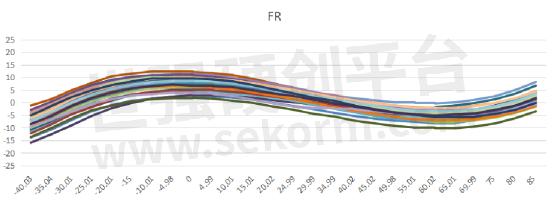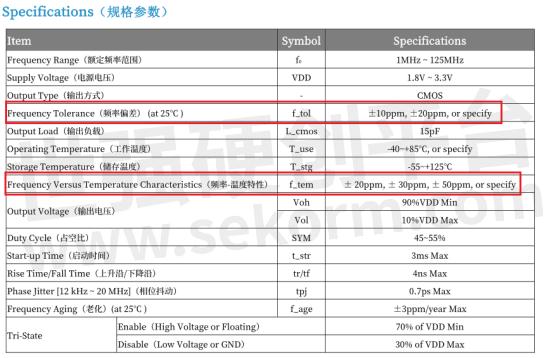Crystal Oscillator PPM Error Analysis and Calculation Method

Crystal oscillator accuracy index: PPM
Crystal oscillator accuracy is usually measured in PPM (Parts Per Million), which describes the frequency stability or deviation of the crystal oscillator. PPM represents the relative error between the actual output frequency and the nominal frequency, and is an important parameter for measuring the frequency accuracy of the crystal oscillator.
How to calculate the frequency difference of the crystal oscillator
The frequency difference reflects the difference between the actual frequency and the nominal frequency of the crystal oscillator. The PPM value of the frequency difference is calculated by the formula as follows:
PPM= (actual frequency − nominal frequency) / nominal frequency X 106
Explanation:
Actual frequency: The actual operating frequency of the crystal oscillator measured by a frequency meter or other appropriate instrument.
Nominal frequency: The standard or nominal frequency specified by the crystal oscillator manufacturer in the crystal oscillator specification book.
Example:
For example, if the nominal frequency of a crystal oscillator is 32.768 kHz and the actual measured frequency is 32.7685 kHz, then the PPM is calculated as follows:
PPM=(32768.5Hz−32768Hz)/32768Hz*106≈15.26
Frequency difference type: normal temperature frequency difference V.S. temperature frequency difference

(curve graph)
The frequency stability of a crystal oscillator will change under different temperature conditions. For a crystal oscillator, its frequency accuracy generally includes two important indicators: normal temperature frequency difference and temperature frequency difference:
1. Normal temperature frequency difference (Frequency Tolerance): It is also called frequency deviation in the YXC specification (see the figure below). It is the deviation from the nominal frequency at normal temperature (25°C), usually expressed in parts per million (PPM).
2. Frequency Versus Temperature Characteristics: It is also called frequency-temperature characteristics in the YXC specification (see the figure below), which refers to the maximum deviation of the actual frequency relative to the nominal frequency within the set operating temperature range, also expressed in parts per million (PPM).

RTC crystal oscillator 32.768KHz frequency accuracy PPM value and time deviation calculation
For the 32.768kHz RTC clock crystal oscillator, the daily time error range can be derived from its frequency accuracy (PPM). The specific steps are as follows:
For example: If the crystal oscillator 32.768KHz accuracy is ±10PPM, the calculation formula for the time error of one day is as follows:
10(PPM)×24(1 day=24 hours)×60(1 hour=60 minutes)×60(1 minute=60 seconds)=864000*1/1000000=0.864 seconds
That is: the time error of the RTC crystal oscillator does not exceed 0.864 seconds per day, that is: if it is +10PPM, it is at most 0.864 seconds faster per day, if it is -10PPM, it is at most 0.864 seconds slower per day.

(Typical application circuit of 32.768KHz crystal resonator)
RTC clock crystal oscillator 32.768kHz daily time error reference table:
a)±10PPM: The actual frequency range is 32768.32768Hz~32767.67232Hz, the daily time error is 0.864×1=0.864 seconds, the monthly error is 25.92 seconds, and the total deviation in one year is 5.184 minutes.
b)±20PPM: The actual frequency range is 32768.65536Hz~32767.34464Hz, the daily time error is 0.864×2=1.728 seconds, the monthly error is 51.84 seconds, and the total deviation in one year is 10.368 minutes.
c)±30PPM: The actual frequency range is 32768.98304Hz~32767.01696Hz, the daily time error is 0.864×3=2.592 seconds, the monthly error is 77.76 seconds, and the total deviation in one year is 15.552 minutes.
- +1 Like
- Add to Favorites
Recommend
- Tips for Crystal Oscillator Circuit Design, Essential Skills for Engineers!
- Does a Passive Crystal Oscillator Have a Direction?
- What Does a Crystal Oscillator Do?
- What is the Function of Crystal Oscillator?
- How to Judge the Quality when Choosing a Crystal Oscillator
- What Is the Difference between Crystal Oscillators and Crystals
- How to Choose a High-quality Crystal Oscillator?
- Working Principle of Crystal Resonator
This document is provided by Sekorm Platform for VIP exclusive service. The copyright is owned by Sekorm. Without authorization, any medias, websites or individual are not allowed to reprint. When authorizing the reprint, the link of www.sekorm.com must be indicated.






























































































































































































































































































































































































































































































































































































































































































































































































































































































